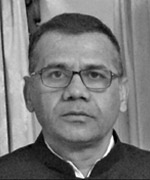Men Over Machines
 R.C. Sharma
R.C. Sharma
Seventy-seven years after independence, and despite several recommendations and reforms, the central armed police forces (CAPFs) continue to suffer from serious systemic problems. These include haphazard and avoidable deployment, unplanned expansion, inadequate training, falling discipline standards, unscientific criteria for selection of senior officers, inter and intra cadre friction, bloated unit structure, faulty human resource development policies leading to acutely slow career progression and higher retirement age. All of these lead to manpower distress resulting in incidents of suicides and fratricides. Cumulatively, these problems impact the very basis of the organisational structure thereby affecting command and functioning. These issues need urgent attention so that a workable solution is found to improve the functioning and cohesion of the CAPF.
The CAPF are deployed in an ad hoc manner to meet the demands of different states. Hence, there is a need for realistic analysis of merits of requisition. For instance, on 23 December 2014, to a query by member of Parliament Kalyan Banerjee pertaining to the deployment of CAPFs, minister of state for home affairs, Kiren Rijiju replied, “CAPF are made available on the request of state governments to assist them in maintaining public order. The level of deployment of CAPFs is not disclosed in the interest of national security.”
The ministry of home affairs needs to devise stringent requisition criteria for assessment of the situation before the CAPFs are deployed for internal security. Requests made for events like festivals, Friday prayers, elections in colleges and local bodies need to be summarily refused. The MHA need to have a standing committee to professionally assess whether the ground situation cited for deployment of CAPFs by states has merit or not. This committee should incorporate state DG and ADG (law & order) as co-opted member to present states position and justification for requisition of CAPFs. The routine, haphazard deployment dilutes the effectiveness of CAPFs. Unless exclusivity of deployment is maintained, these forces will lose their deterrence value, adversely affecting internal security.
The central police forces need planned expansion based on external and
Subscribe To Force
Fuel Fearless Journalism with Your Yearly Subscription
SUBSCRIBE NOW
We don’t tell you how to do your job…
But we put the environment in which you do your job in perspective, so that when you step out you do so with the complete picture.








 VIDEO
VIDEO